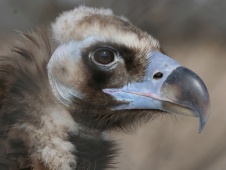
Vultures are keystone species that perform a vital ecosystem service by disposing of carrion. In Armenia, an Important Bird Area (IBA) Caretaker is working with a network of local people to make livestock carcasses available for Cinereous Vulture Aegypius monachus, reviving a traditional disposal practice that is benefiting both farmers and one of the region’s rarest raptors.
Armenia’s Cinereous Vulture Aegypius monachus population fell from 50 pairs in the 1960s to just six pairs in 2003. The decline is thought be linked to shortages of food. Following the demise of Soviet infrastructure, there was an upsurge in the over-harvesting and illegal killing of wild ungulates and other mammals. This, coupled with changes in animal husbandry that resulted in huge reductions in livestock, has dramatically reduced the amount of available carrion. In addition, traditional methods of above-ground disposal of livestock carcasses and other waste are no longer commonly practiced. Vultures provide a crucial ecosystem service through the disposal of animal remains and their decline can have dramatic ecological and socio-economic consequences.
One response has been to establish feeding places for vultures or ‘vulture restaurants’, where the carcasses and waste products of animals slaughtered on farms and by communities are put out for vultures. Vardges Gharakhanyan, a local Caretaker at the Noravank IBA, is working with the priest of the Noravank monastery to establish a vulture feeding place in the IBA. By mobilising local community members, they are trying to make sure that all animal waste is saved and made available for vultures. The vulture restaurants will also resolve sanitary issues in Noravank and its neighborhood. Farmers are able to dispose of dead stock in the most practical way, reducing the potential spread of on-farm disease. Vardges and his local Caretaker group have developed a network of local people who are willing to help. Pick-up of vulture food is arranged at weekends to allow disposal of all animal waste that accumulates over the week. Artificial feeding of vultures also has educational benefits and may result in an increase in the number of tourists who visit the IBA to see these majestic birds.
This case study is taken from ‘Empowering the Grassroots—BirdLife, Participation, and Local Communities’. To learn more about this publication and download the report in full click here.
Related Case Studies in other sections
Related Sites
Related Species
Compiled: 2011 Copyright: 2011
Recommended Citation:
BirdLife International (2011)
A 'Vulture Restaurant' in Armenia solves conservation and sanitation problems.
Downloaded from https://datazone.birdlife.org/sowb/casestudy/a-'vulture-restaurant'-in-armenia-solves-conservation-and-sanitation-problems on 22/12/2024